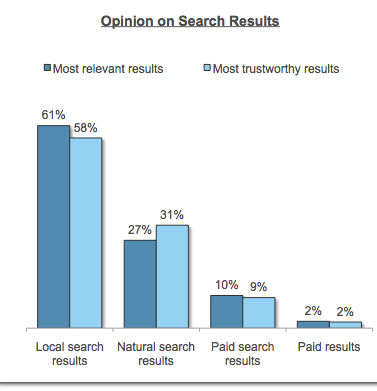Local search listings now act as a business’ online anchor identity pulling in important information like website URL, reviews, photos, coupons and hours of operation. These online listings tether all critical information consumers need about a business in order to make a purchasing decision.
Local Search Results are the Most Relevant

According to the 2012 Localeze/15miles Local Search Usage Study, conducted by comScore, 61 percent of respondents said when searching for local business information, local search results are the most relevant, while 58 percent found them to be the most trustworthy when compared to natural search results, paid search results and paid results. Business listings are often viewed as trusted search results because they represent the place where multiple biases meet to give the searcher a 360-degree view of the business.
As for the full landscape of search results – previously, national advertisers dominated paid search results, some were brick and mortar, but some were not. So, consumers searching for local business information, where geography was a critical component, were conditioned not to find value with national ads because they weren’t finding businesses at a granular level. Instead, the closest national chain would appear in results whether it was 5 or 15 miles from home, often leaving a consumer frustrated because merchants who were closer were not at the top of results.
Search is much more specific today and business listings are the go-to for providing consumers with businesses in close proximity of where they live and work. The popularity of location-based apps and social networks make it even more important for search results to produce business listings based on a searcher’s location. And these listings must be accurate (e.g., the phone number is correct, the website is listed and any relevant user reviews are connected).
Name, Address, Phone Number Critical to Local Searchers
In addition to consumers’ focus on local business listings, the Local Search Usage Study found that address details and phone numbers remain the primary pieces of information consumers seek (or are looking for) when they perform a local search – yet, a recent SMB DigitalScape study found that 60 percent of small- to medium-sized business fail to list a phone number on their homepage). This is followed by hours of operation, maps, website URL, distance to business and driving directions.
Most local searchers are looking for quick referential info – an address or a phone number to contact, especially on mobile devices. Searchers are increasingly looking for more descriptive content, in particular for higher-priced purchases or business categories like contractors or auto dealerships.
What does this mean for national brands? More brick and mortar national brands are realizing that online local search business listings are not advertising, yet they need to be part of their marketing efforts because without providing consumers name, address and phone number (NAP) information, their national advertising campaigns are not complete. Combine that with local listings’ impact on how businesses and brands are found on mobile and social sites and national advertisers are now viewing local search listings as a necessary component of their overall digital strategy.
Growth of Mobile-Local Search
Businesses of all sizes need to be more aware of how their local listings look online and across mobile search sites. The growth of mobile-local search is driving more category-based searches. In fact, more local business searches are conducted without a specific business in mind, according to the survey, showing that more research is being done online early in the search process.
This is because on-the-go consumers are hyper-influenced by location and are willing to trade business name for category specificity. As an example, someone traveling to New York City might search for a Smith & Wollensky for dinner. However, that same person, who just left a meeting on 32nd and Park Avenue also might be willing to visit any number of upscale steak restaurants within walking distance.
With increased smartphone adoption and prevalence of mobile-local apps, consumers are getting more comfortable with local search and finding ways to expand their use of it.
Bottom Line
Today, local listings are the search results most unaffected from advertising bias and monetization so they rank high in algorithms. The organic web results section still has a respectable amount of relevance and trustworthiness, primarily due to the vertical or hyper-local nature of some search sites, but may be suffering from the fact that savvy local search consumers know how and where to get answers quickly.
